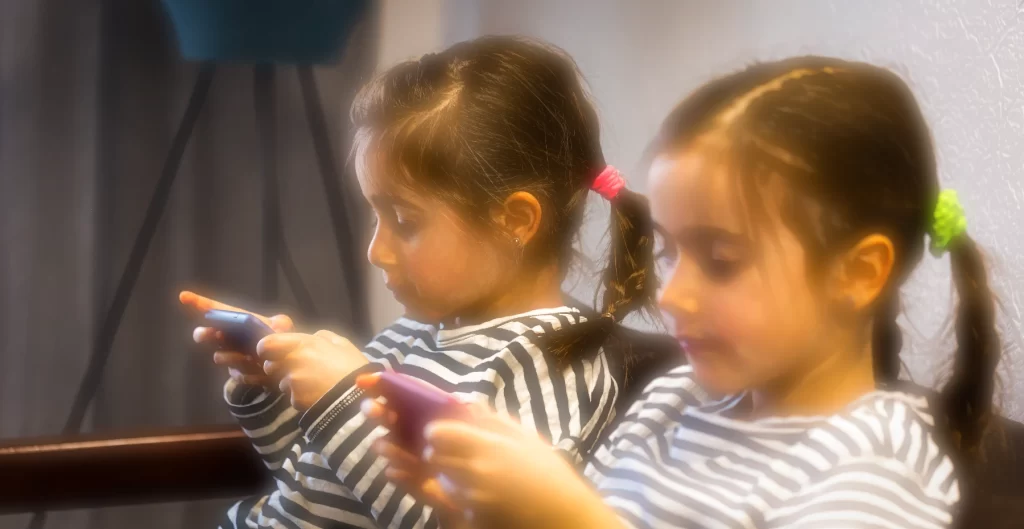Smartphones have become a huge part of our daily lives, and kids are spending more time on them than ever.
Before smartphones, children used to spend time coloring books and solving puzzles—activities that helped them develop creativity, problem-solving skills, and focus.
But now, screens have taken over, reducing the time kids engage in hands-on learning and real-world interactions.
Although technology offers many advantages, too much screen time can compromise a child’s relationships, health, and education.
Many parents are unaware of how quickly smartphone use can turn into an addiction, affecting their child’s development in ways they don’t realize.
The following explains why smartphone addiction is becoming a rising issue:
A. Simple screen access
Children of today live with computers, tablets, and cellphones all around.
Many youngsters acquire their own phones at a young age—sometimes as young as six.
Children with unrestricted internet access can play games, view movies, or message friends anytime.
B. Smartphones Are Extremely Addictive.
Video apps, internet games, and social media are meant to enthrall children for hours.
Children find it difficult to stop using their phones given endless scrolling, notifications, and rewards in games.
Many children feel compelled to constantly check their phones even though they ought to be sleeping or studying.
C. Parents Often Find It Difficult to Set Boundaries
Sometimes parents use phones as babysitters since they keep children occupied.
Many parents are unsure of how to block unsuitable content or set screen time limits.
Children often argue or sneak extra screen time even with rules created.
Unchecked use of a smartphone can compromise a child’s health, education, and relationships.
Parents should thus intervene to enable their children to strike a good balance between screen time and real-life events
The Alarming Rise of Smartphone Addiction in Children

The increasing dependence on smartphones among children has become a significant concern for parents, educators, and health experts alike.
With easy access to digital devices, children as young as six are spending hours on screens, often unsupervised.
This excessive use is not just a passing phase—it has serious long-term consequences on their development, health, and social skills.
Here’s a closer look at the factors driving smartphone addiction in children:
A. Statistics on Smartphone Usage Among Children.
The numbers paint a concerning picture of how deeply ingrained smartphones have become in children’s daily lives.
- Studies show that children between 8 and 12 years old spend an average of 4 to 6 hours on screens per day, while teenagers spend over 7 hours—excluding school-related screen time.
- Over 53% of children in the U.S. own a smartphone by the age of 11, and by age 12, this number jumps to nearly 70%.
- Many children use smartphones as their primary entertainment source, often replacing outdoor play, reading, and creative activities.
- The COVID-19 pandemic accelerated digital dependence, as children turned to screens for education, entertainment, and social interactions.
B. How the Average Screen Time Has Increased Over the Years
- A decade ago, children had limited access to smartphones and mainly used TV or computers for entertainment. Today, smartphones have become an all-in-one tool for gaming, video streaming, and social media.
- From 2015 to 2023, children’s daily screen time increased by nearly 50%, with many now spending more time on screens than on any other activity besides sleeping.
- The “always-on” culture means that smartphones are rarely put away, making it difficult for kids to disconnect.
- Many parents unintentionally contribute to this trend by using smartphones as babysitters, allowing children to stay occupied while they focus on work or household tasks.
C. The Role of Digital Entertainment, Gaming, and Social Media in Driving Addiction
Smartphones are designed to be addictive, and children, with their developing self-regulation skills, are especially vulnerable.
- Gaming Addiction: Mobile games are highly engaging due to instant rewards, competitive challenges, and social features. Many games include daily login rewards, pushing children to return every day.
- Social Media Influence: Platforms like TikTok, Instagram, and YouTube encourage endless scrolling, making it hard to stop. Algorithms feed children content based on their preferences, creating a dopamine-driven cycle of engagement.
- YouTube and Video Streaming: Children often binge-watch videos for hours due to autoplay features that keep them hooked. Many children start watching educational videos but quickly transition to entertainment content.
- FOMO (Fear of Missing Out): Social media and online gaming create a pressure to stay connected at all times, leading to anxiety and emotional dependency on digital interactions.
As smartphones continue to dominate children’s lives, the challenge for parents is to recognize the addiction early and take steps to manage screen time before it leads to long-term consequences.
Signs That Your Child May Be Addicted to Smartphones
Smartphone addiction doesn’t happen overnight. It starts with small habits that grow over time.
Many parents don’t realize their child is addicted until it starts affecting their health, behavior, and daily activities.
Here are some clear signs to watch for:
A. Behavioral Signs
- Irritability & Mood Swings: Your child gets angry, frustrated, or upset when you take away their phone.
- Loss of Interest in Hobbies: They no longer enjoy activities like playing outside, reading, or spending time with family.
- Lying About Screen Time: They hide their phone use or say they were doing homework when they were actually playing games or watching videos.

B. Physical Signs
- Eye Strain & Headaches: Too much screen time can cause dry eyes, blurry vision, or frequent headaches.
- Sleep Problems: Your child stays up late using their phone, leading to tiredness and difficulty waking up for school.
- Lack of Physical Activity: They prefer using their phone over playing outside or exercising, which can lead to weight gain and poor posture.
C. Emotional Signs
- Anxiety & Restlessness: They constantly check their phone, even when they don’t need to.
- Decreased Attention Span: They struggle to focus on schoolwork or conversations without checking their phone.
- Social Withdrawal: They spend less time with family and friends in real life, preferring online interactions.
If you notice these signs, it may be time to take action before the addiction worsens.
The Negative Impact of Smartphone Addiction on Children
Smartphones can be useful, but when children use them too much, they can cause serious problems. Excessive screen time affects their physical health, learning, emotions, and social skills.
Here’s how smartphone addiction harms children:
A. Physical and Mental Health Effects
- Eye Strain & Poor Sleep: Staring at screens for too long causes dry eyes, headaches, and trouble sleeping. Blue light from screens affects their sleep, making them tired and less focused.
- Lack of Exercise & Obesity: Kids spend more time sitting with their phones instead of playing outside, leading to weight gain and weak muscles.
- Increased Stress & Anxiety: Constant notifications, social media pressure, and gaming addiction can make children anxious and stressed.
B. Problems with Learning & School Performance
- Shorter Attention Span: Too much screen time makes it hard for kids to focus on schoolwork. They may struggle to concentrate in class or finish homework without distractions.
- Poor Academic Performance: Children addicted to smartphones often rush through homework or avoid studying, leading to lower grades.
- Less Creativity & Problem-Solving Skills: Instead of using their imagination, they rely on videos and games for entertainment, which limits creative thinking.
C. Emotional & Social Issues
- Less Real-Life Interaction: Kids prefer texting or gaming instead of talking to family and friends. This makes them feel lonely and affects their communication skills.
- Low Self-Esteem & Comparison: Social media makes children compare themselves to others, leading to low confidence and unhappiness.
- Risk of Cyberbullying: Spending too much time online increases the chances of being bullied, which affects their mental well-being.
If left unchecked, smartphone addiction can seriously affect a child’s growth and happiness.
Why Parents Struggle to Control Smartphone Usage
Many parents are aware that too much screen time is detrimental for their children, but limiting smartphone use is difficult. Children object to restrictions, and modern living makes it more difficult for parents to track screen time.
Here are some typical difficulties parents encounter:
A. Peer Pressure: “All My Friends Have a Phone!”
- Children want to fit in with their friends. If everyone at school has a smartphone, they feel left out without one.
- Social media and gaming trends make kids feel like they need to be online all the time.
B. Smartphones as a Convenient Babysitter
- Parents are busy with work and household tasks, so they often give children a phone to keep them occupied.
- Over time, kids get used to using smartphones for entertainment, making it harder to reduce screen time.
C. Lack of Awareness About Parental Controls
- Many parents don’t know how to set screen time limits, block harmful content, or monitor their child’s phone use.
- Even when parental controls are in place, children often find ways to bypass them.
D. Parents Also Struggle with Screen Time
- Children learn from what they see. If parents spend too much time on their phones, kids are likely to do the same.
- Many parents feel guilty about taking away their child’s phone when they also rely on screens for work and entertainment.
Balancing technology and real life is challenging, but understanding these struggles is the first step to making a change.
How to Solve the Issue Without Taking Extreme Measures?
Stopping children from using smartphones completely is not the answer. Instead, parents should slowly reduce screen time and introduce fun activities that keep kids engaged in the real world.
The goal is to help children enjoy life beyond screens while still allowing them to use technology in a healthy way.
A. Replace Screen Time with Fun Activities
- Encourage kids to color, solve puzzles, draw, or do craft projects instead of watching videos or playing games.
- Board games, storytelling, or building with blocks are great ways to keep their minds active.
- Outdoor activities like cycling, playing sports, or even gardening help children stay physically active.
B. Join Your Child in These Activities
- Kids follow what parents do, so spending time together makes non-screen activities more fun.
- Sit down and color with them, solve puzzles as a team, or enjoy a fun game night as a family.
- Show excitement about offline activities, so children feel encouraged to take part.
C. Set Small, Realistic Limits on Screen Time
- Instead of banning phones, reduce usage step by step by setting phone-free times (like during meals or before bed).
- Praise kids when they choose a book, puzzle, or coloring sheet instead of a screen.
By slowly introducing new activities, children will naturally spend less time on their phones. Instead of letting screens take over, give them something fun and creative to do! Coloring books and puzzles are a great way to keep kids engaged, improve their focus, and spark creativity—all without a screen. Looking for fun and educational alternatives? Explore some exciting coloring books and puzzle sets on Amazon.com and help your child enjoy screen-free entertainment today!
Click on the book’s thumbnail to see details.
Coloring Books 
Puzzles & Story Book

![]()


















